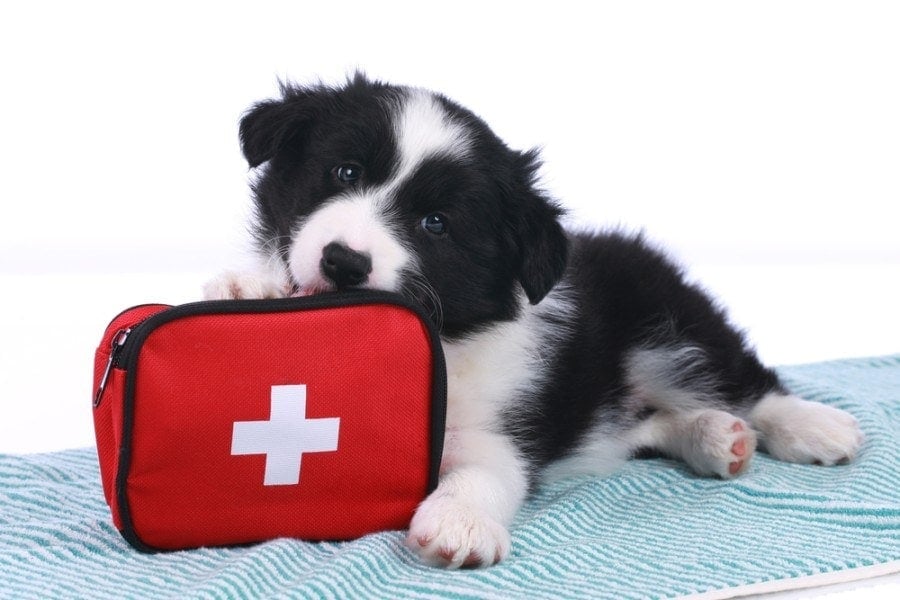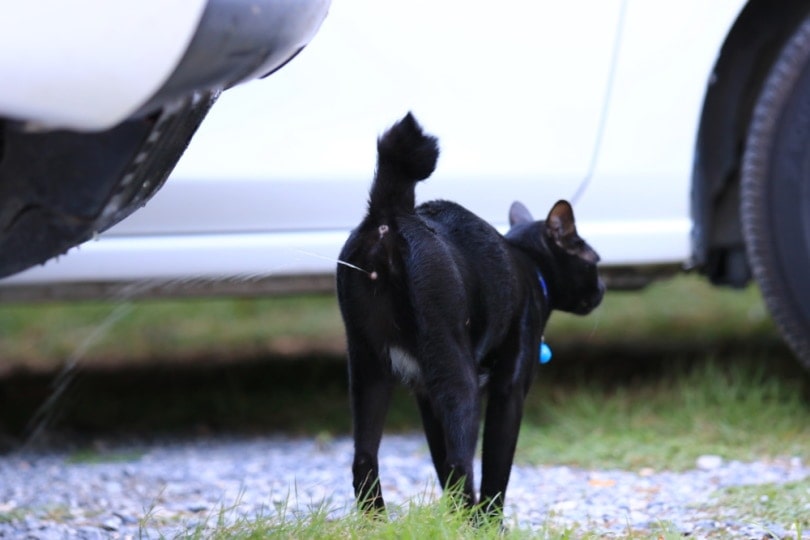Why Do Dogs Eat Poop? 9 Vet Explained Reasons & What to Do
Updated on
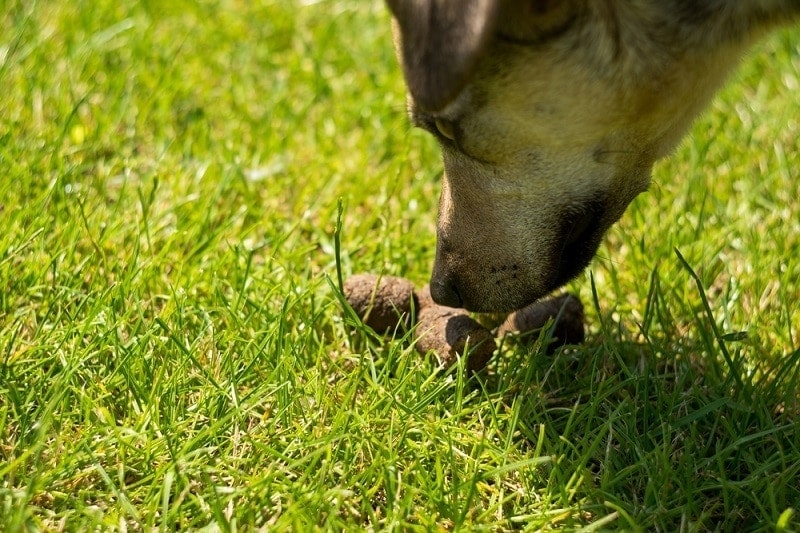
Dogs eating poop is an icky, though not uncommon, problem. Known as coprophagia, this behavior isn’t always as abnormal as you might think. Since it can sometimes indicate something is wrong, here are nine reasons a dog might be eating poop and things you can do about it.
The 9 Reasons Why Dogs Eat Poop
1. Learned Behavior
Early in life, eating poop is very normal for a dog. Nursing mothers will clean their puppies, including licking and eating any urine or stool they produce. The puppies can often pick up on this behavior. While most dogs will outgrow this as they move beyond nursing, young dogs may persist in the behavior into adulthood.

2. Nutritional Deficiency
Dogs experiencing a nutritional deficiency will be more likely to eat stool in an attempt to find the nutrient they’re lacking. This is rare for dogs on a commercial diet as these are fully formulated with everything they need, but homemade diets can be a common culprit for nutritional deficiencies in dogs.
Dogs eating a proper diet may also experience a nutritional deficiency if they can’t absorb the nutrients from their diet as they should. Dogs with chronic diarrhea, pancreatic disease (the pancreas is the organ that produces the enzymes they need to break down food), or other GI diseases may not be able to absorb nutrients appropriately.
3. Intestinal Parasites
Speaking of reasons a dog might not be absorbing nutrients appropriately, intestinal parasites such as worms can steal nutritional resources from dogs, causing them to start eating poop.
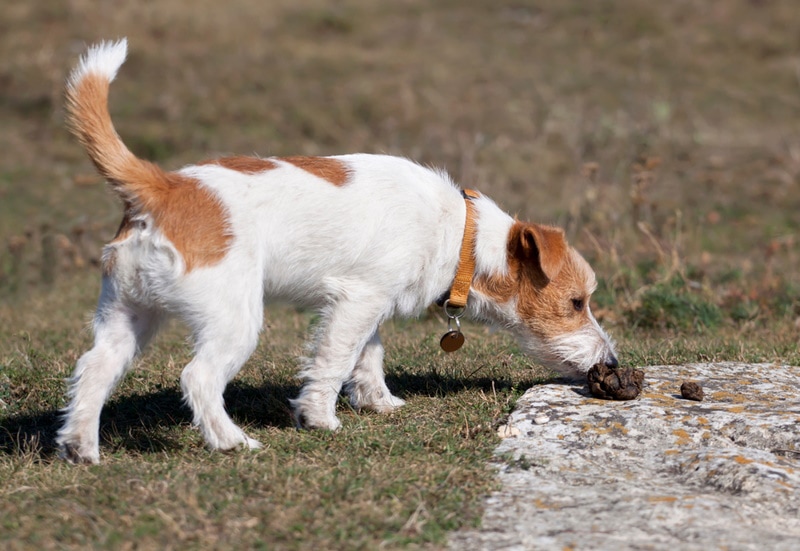
4. Polyphagia
Dogs with polyphagia continue to eat, thinking they’re still hungry when they actually aren’t. This can cause them to start eating non-food items as well, such as poop. Some examples of diseases that can cause polyphagia are thyroid disorders, Cushing’s disease, and diabetes.
5. Pica
Dogs that eat non-food items have something called pica. It can be triggered by polyphagia but also liver disease and anemia. Poop is a common item for pica dogs to eat.
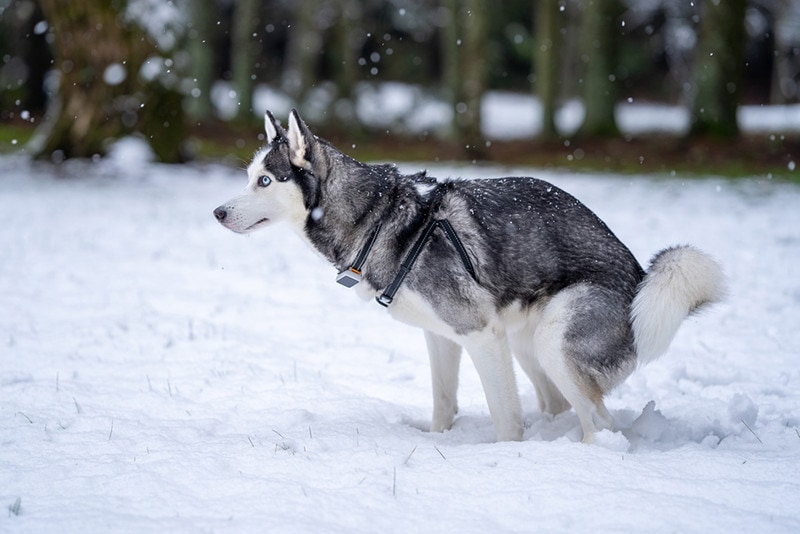
6. Dementia
As dogs age, they can develop dementia, just like humans. As they become less aware of their surroundings, they can mistake poop for food and may begin having this behavior when they never did before.
7. Anxiety
Anxious and stressed dogs can pick up compulsive behaviors, which may include eating poop. Sometimes certain triggers will precipitate the behavior; other times, this may be a daily issue for that dog.
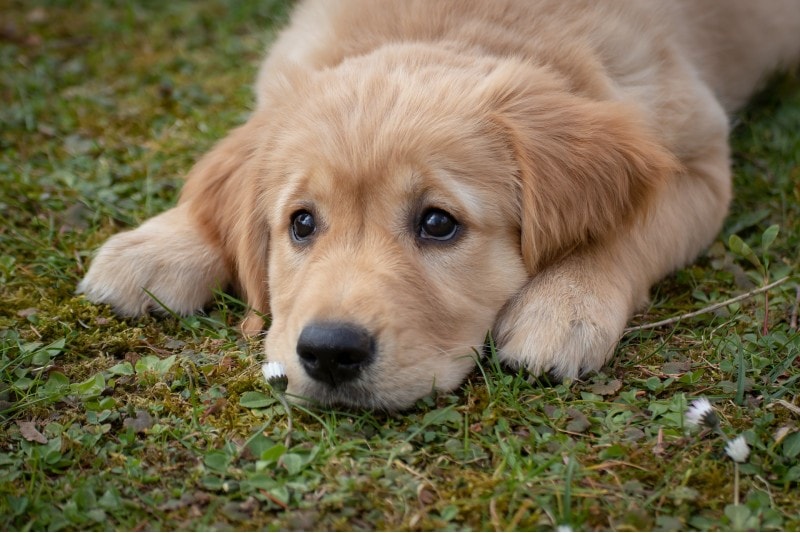
8. Hiding an Accident
Dogs that know they aren’t supposed to poop inside but have an accident may try to hide the evidence. This can also be true of potty-training puppies. These dogs may only eat poop inside the house, not out in the yard, or only when they see you coming.
9. They Like It
Some dogs just like the taste of poop. If not given enough other things to do and if not as full as they think they should be, they may find these poops to be treat-free for the taking.
With so many possible reasons for a dog to be eating poop, what then is an exacerbated dog owner to do about it? Luckily, we have just as many possible solutions for you as we do possible reasons for the behavior.
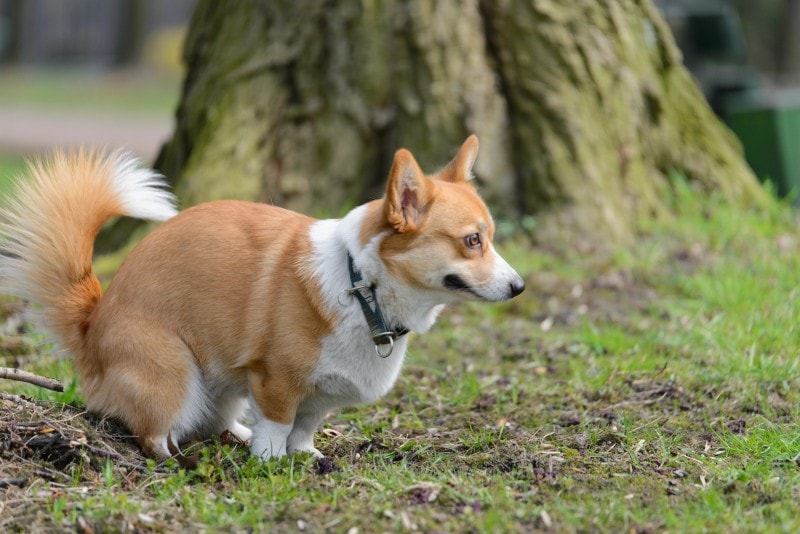
What to Do About Dogs Eating Poop
- Pick Up the Poop: The best first step when faced with a dog that’s eating poop is to start picking up their poop immediately. This means no unsupervised yard time and may require always keeping them on a leash. The hope is that this wouldn’t be forever, just several weeks or months to break them of the habit. Poop is just weird enough of a treat that removing it from their diet for a period may adjust them off wanting it anymore.
- Scavenging Muzzle: As an alternative to constant leash time, dogs can also be fitted with a basket-type muzzle that allows free movements of their mouth for drinking and panting but is a barrier between the dog and anything they want to scavenge to eat.
- Put Something on the Poop to Change the Taste of the Poop: Sprinkling flavors a dog doesn’t like onto the poop as a deterrent may lead to them learning not to eat any poop at all. Some common items people try are hot sauces, cayenne pepper, or lemon juice. You do want to be careful as this doesn’t always work, and ingesting large quantities of these things can cause an upset stomach for your dog.
- Put Something in Their Food to Change the Taste of the Poop: Adding certain things to a dog’s poop seems to alter the flavor in a way that some dogs don’t like. Examples include pineapples or pineapple juice, apple cider vinegar, probiotics, charcoal treats, spinach, or over-the-counter coprophagia supplements.
- Slow Feeder Bowls: Since some cases of coprophagia are due to improper nutrient absorption, digestive support can sometimes help correct this behavior. Slow feeder bowls keep dogs from eating their meals too quickly, and this slower digestion allows more time for nutrient absorption.
- Energy Outlets: Poop eating can definitely be a symptom of boredom. Increasing a dog’s exercise and giving them games to play that engage the mind can improve or resolve poop eating in some dogs. Puzzle feeders are also a way to combine slowing down their eating with engaging their minds to prevent boredom-related behaviors like coprophagia.
- Diet Change: Switching some dogs onto GI diets or adding pumpkin into their current diets as an extra source of fiber can sometimes help with poop-eating behaviors. Be sure to always consult with a veterinarian first before implementing a diet change.
- Anxiety Medication: For dogs suffering from significant daily anxiety causing obsessive behaviors that may include poop eating, daily anxiety medication can make a world of difference. Be sure to speak to your veterinarian if you think this may play a role in this behavior for your dog.
- Positive Reinforcement: For dogs that eat poop to get your attention or to hide poop when it’s somewhere they think it shouldn’t be, excessive negative attention can make the problem worse. Focusing on not providing attention around the behavior and instead rewarding a different behavior that you do want to see, such as going to a certain area after pooping, can help solve your dog’s poop-eating dilemma.
Conclusion
Dogs can eat poop for many reasons. In most cases, dogs eating poop doesn’t pose a health risk beyond possible fecal parasite transmission, but that doesn’t mean it isn’t a problem. Unfortunately, some dogs are more attached to the behavior than others and so interventions may not work when trying to get them to stop. Luckily, even for those dogs, there are still ways to keep them from eating poop, such as anti-scavenging muzzles.
Whenever you notice that your dog is eating poop, especially if this is a new behavior, always bring this up to your veterinarian so they can screen for medical causes, and if they clear your dog, then feel free to use this list for interventions you can take to try and stop their coprophagia.
See Also:
Featured Image Credit: xtotha, Shutterstock



